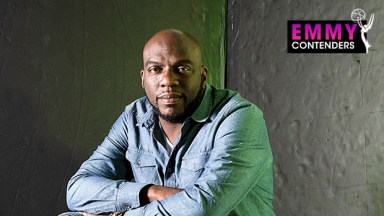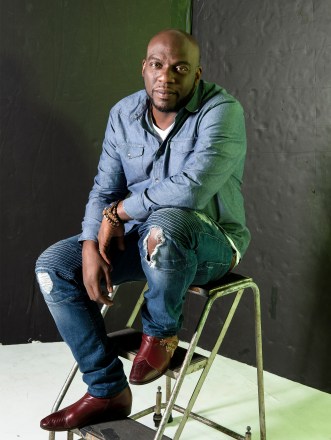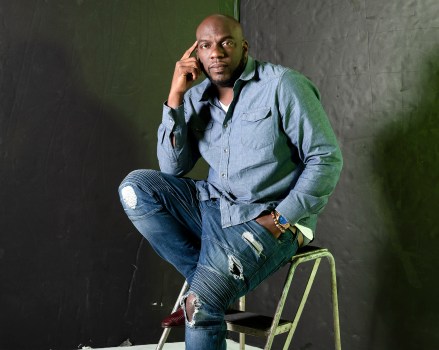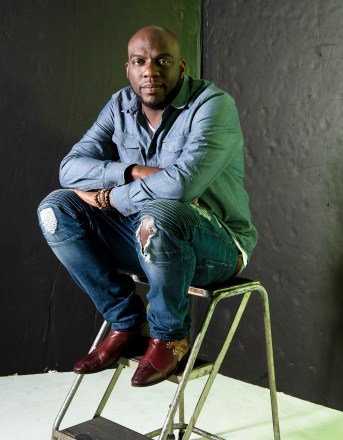
Queen Sugar, which airs Wednesdays on OWN, is a force to be reckoned with. The show, created by Ava DuVernay, is now in its third season and just keeps on getting better. The storytelling is masterful, and so are the performances. This is a series that you should be watching.
HollywoodLife sat down EXCLUSIVELY with Omar J. Dorsey, who plays Hollywood, to talk about the incredible series. From Hollywood and Vi’s effortless relationship to Hollywood being a shoulder of support to Ralph Angel, Hollywood helps the Bordelon family stand. This show explores the black southern experience like no other series on television and has proven time and time again why it’s worthy of Emmys. Check out our Q&A with Omar below.
Hollywood and Violet break down the stereotype of the younger man/older woman relationship, and I love that about them. Are we really going to see these two get married?
Omar J. Dorsey: Yeah, I think so! Definitely, I think so. He’s telling everybody that he’s planning this big wedding. I hope that’s where it leads to. What I do love about the relationship is that after about one or two episodes you forget about the age difference [Hollywood is at least 10 years younger than Violet]. It’s just two humans co-existing and age really means nothing to them. Every once in a while, Vi might ask Hollywood, “You sure you don’t want any kids? That’s not something I could do.” Even from the beginning, it wasn’t like, oh, look at that young dude with the older woman. It was always just Hollywood and Vi. I think Ava [DuVernay] when she was creating those characters, that’s something she didn’t even want to go through.
There was a moment in a previous episode at Hollywood’s class reunion where Vi seemed a little off. We know that she has lupus, but should fans be worried?
Omar J. Dorsey: That’s just a side effect of the condition that she lives with while still doing everything that she can. She’s running a business. She’s making all the pies and doing all the financials, but sometimes things can get overwhelming, even if you’re dealing with anything health wise.
Vi’s had some issues with work. There was a moment early on the season where she declared, “This is my time.” How is Hollywood going to be helping her?
Omar J. Dorsey: Oh, he’s so supportive.
He’s truly the most supportive man.
Omar J. Dorsey: But sometimes it can be overwhelming. He’s going to have to learn that balance, especially if he’s going to be there all the time, where they’re living together and she is doing this business. She’s a strong person, but this is her business. She doesn’t need anybody, I don’t care who it is, to try and tell her how to do her business. But even with that, I think Violet will see that there’s no harm in asking for help.
Is Hollywood OK with not having kids? Could he and Vi possibly consider adoption?
Omar J. Dorsey: You know, Hollywood and his ex wife had a miscarriage. He does spend a lot to time with Blue [Ralph Angel’s son] and that feeds a lot of that paternal instinct he has. I think that maybe it’s something that crosses his mind every so often. While he would love to be a father, he’s made his decision in life. Maybe he could adopt a child. I don’t know. We haven’t really explored that yet. If that comes up, that would be something that’s totally different, too. To have had a wife who was pregnant and lost a child, that is probably something that’s on his mind from time to time.
Charlie is wading deeper and deeper into this war with the Landry family. Is that going to have lasting impact on the family?
Omar J. Dorsey: You know, I think they’re putting a lot of trust in Charlie.
She’s a different ball game than the rest of the Bordelons.
Omar J. Dorsey: She’s cut from a different cloth, and she’s a ruthless businessperson. I think the Landrys might be playing her a little bit softer than what she truly is. Everybody has, and she always comes out on top. I would like to see where this goes. She says she wants to break that company down brick by brick, and I want to see how she’s going to do that. That is what’s going to be the interesting part. I think they’re putting a lot of faith in her.
One of the biggest things to happen at the end of season 2 was the revelation that Blue may not be Ralph Angel’s biological child and now we know he’s not. With Ernest gone, is Hollywood going to continue to be that paternal figure for Ralph Angel and helping him navigate life after this bombshell?
Omar J. Dorsey: It’s a dynamic that I love. I love working in scenes with Kofi. I’ve known him since he was a kid in real life and to see the man that he has grown to be is an amazing thing. But that dynamic between Hollywood and Ralph Angel is something that’s paternal, especially since Ralph Angel’s father passed away. It’s something that Hollywood… I don’t even know if he feels the need to be Ernest, but I think he does feel the need to guide a young man who may be going through difficulties. Ralph Angel always gets a lot thrown at him at all times, whether it’s being a felon and trying to navigate life, the stuff with the boy we thought was his child and now knows it’s not his child. All Hollywood can do is try and be as much support as he can. The one scene that resonates a lot with me was when Hollywood told Darla in season 2 that she really didn’t have to tell anybody about this because that kid is our kid. He’s the whole family’s kid, and Hollywood knew it would throw everything into a flux. As far as the evolution of the Ralph Angel character, he started out as a baby. He was the baby of the family, and they treated him as such. In season 3, he’s not making these bad mistakes. He’s making grown man decisions, and Kofi is playing that very well.
One thing that has shocked me is that the show has never been nominated for an Emmy. Why would not be the perfect opportunity to recognize the show?
Omar J. Dorsey: I just hope that enough eyes are on it. In season 1, there was a lot of buzz and to be honest we didn’t get nominated for any mainstream awards, but we won every single solitary award for black people — The Image Award, the African-American Film Critics Association Award. We won Best Drama in every single category that were nominated for, and there were some strong shows. This Is Us was in there, Atlanta was in there. The shows that always get nominated. I just hope enough eyes are going to be put on it. I don’t really do stuff for the awards, but the recognition, especially for the writing would be something that would be extremely satisfying. We go out and do other projects, but this home to me. Queen Sugar has been my home for the past 3 years, and it’s where I can lay my hat down. This is where I live literally and figuratively. Just to be recognized would be awesome. Like I said, I don’t do anything for awards, but it wouldn’t be bad.
The show has a really passionate fanbase. What’s the fan interaction been like for you?
Omar J. Dorsey: A lot of men really relate to Hollywood. One guy came up to me, and I didn’t know him, and he said, “You really make southern men look really good.” That really warmed my heart. I’m from the South. All I’ve ever wanted to do was to make southern men and black men look good, because the stereotype is on both of those — the southern bumpkin or the black guy who is a criminal. We talk about the people the way they really are. These are real people, and the storytelling is so immaculate on this show.
It’s a show I have never seen on TV, one that explores the black southern experience. We’ve seen predominantly African American shows set in huge hubs like Chicago and New York, but this show takes you away from all the noise and takes you to something much quieter. As a southern man, what’s it’s like to be a part of a show that explores that?
Omar J. Dorsey: The thing about black people in America, most of us are two generations from being from the South. I grew up in Atlanta. That’s a hub, but my mother is from McDonough, Georgia, and my father is from Camilla, Georgia. These are southern, rural places. Those are the places I went to in the summertime. A lot of African Americans, they’re second generations, so they’re from New York, Chicago, or LA. They took summers in the south. They know these people, and it reflects on them. It’s just a sense of home.
Ava is the creator of Queen Sugar and the show is on Oprah Winfrey’s network. What’s it like having their support and working on a show together?
Omar J. Dorsey: As busy as Ava is, I’ll be honest, I can text her, and she’ll text me right back. I know she’s busy. I know they’re prepping for movies, miniseries, numerous television shows… as busy as they are, they’re always there when you need them. We’ve become family. This is my fourth year working with Ava and Oprah. I started out with them on Selma, so this is the fourth year that I’ve been able to work with those amazing, talented women. They’ve changed my perspective on a whole lot of things just in life, because they’re busy, but they’re not too busy for us. They’re probably the two busiesy people I’ve ever met in my life. They’re out here trying to move and shake. They’re changing the world. They’re changing perspectives on race, gender, and I appreciate everything that they’re doing.
How do you feel about the show having all female directors for the third straight season?
Omar J. Dorsey: They go and take the baton and run with it. It opens it up for the next crop that’s coming in. Before Queen Sugar, I had been directed by one or two females whose names were not Ava Duvernay. I’ve been acting on film for 20 years and that’s preposterous. Female directors have brought so much out of me that I never knew I had, and I think it’s nothing but a blessing.


